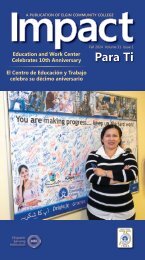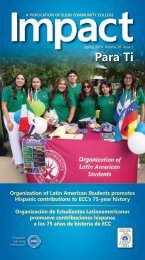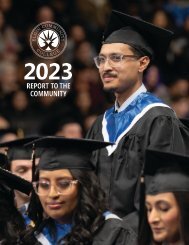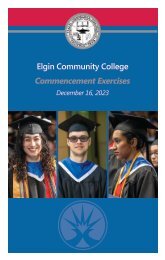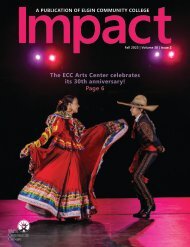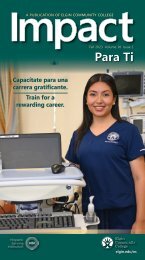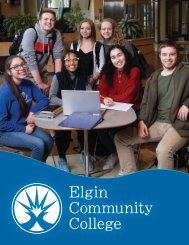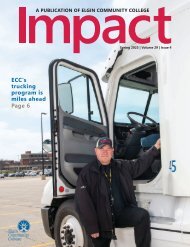ILEA Equity Plan | Elgin Community College (ECC)
There are wide and persistent gaps in college completion rates in Illinois, especially among students of color and low-income students. After an in-depth analysis of our institutional data, Elgin Community College (“ECC” or “the College” or “we” or “our”) has developed an Equity Plan containing annual growth targets for which progress updates will be shared publicly over the next five years. Our Equity Plan reflects the unique characteristics of our institution. For example, ECC is designated as a Hispanic Serving Institution by the US Department of Education, with just over 42% of the students identifying as Latinx or Hispanic. Also, the district served by ECC is widely diverse in terms of income and educational attainment. We will identify the obstacles students face and develop programs and policies that break down unnecessary college graduation barriers. Along with our fellow colleges, in the Partnership for College Completion organization, with this Illinois Equity in Attainment (“ILEA”) plan, we pledge to close the completion gaps by 2025.
There are wide and persistent gaps in college completion rates in Illinois, especially among students of color and low-income students. After an in-depth analysis of our institutional data, Elgin Community College (“ECC” or “the College” or “we” or “our”) has developed an Equity Plan containing annual growth targets for which progress updates will be shared publicly over the next five years. Our Equity Plan reflects the unique characteristics of our institution. For example, ECC is designated as a Hispanic Serving Institution by the US Department of Education, with just over 42% of the students identifying as Latinx or Hispanic. Also, the district served by ECC is widely diverse in terms of income and educational attainment. We will identify the obstacles students face and develop programs and policies that break down unnecessary college graduation barriers. Along with our fellow colleges, in the Partnership for College Completion organization, with this Illinois Equity in Attainment (“ILEA”) plan, we pledge to close the completion gaps by 2025.
You also want an ePaper? Increase the reach of your titles
YUMPU automatically turns print PDFs into web optimized ePapers that Google loves.
10. Works Cited<br />
Article 26 of the United Nations’ Universal Declaration of Human Rights<br />
https://www.un.org/en/universal-declaration-human-rights/<br />
Colvard, N. B., Watson, C. E., & Park, H. (2018). The Impact of Open Educational Resources on<br />
Various Student Success Metrics. International Journal of Teaching and Learning in Higher<br />
Education, Volume 30, Number 2, pp. 262 – 276. http://www.isetl.org/ijtlhe/ISSN 1812-9129<br />
Goldston, Cora (September 19, 2017).<br />
https://ies.ed.gov/ncee/edlabs/regions/midwest/blogs/culturally-responsive-instruction-bestpractices.aspx<br />
Hilton III, J. L., Fischer, L., Wiley, D., & William, L. (2016). Maintaining Momentum Toward<br />
Graduation: OER and the Course Throughput Rate. The International Review of Research in<br />
Open and Distributed Learning, 17 (6). https://doi.org/10.19173/irrodl.v17i6.2686<br />
Klepfer, K. & Hull, J. (2012). High school rigor and good advice: Setting students up to succeed.<br />
Center for Public Education (National School Boards Association).<br />
http://www.centerforpubliceducation.org/MainMenu/Staffingstudents/High-school-rigor-andgood-advice-Setting-up-students-to-succeed<br />
Krasnoff, Basha. (2016). Culturally Responsive Teaching: A Guide to Evidence-Based Practices<br />
for Teaching All Students Equitably<br />
https://educationnorthwest.org/sites/default/files/resources/culturally-responsiveteaching.pdf<br />
Ladson-Billings, G. (1994). The dreamkeepers: Successful teachers of African American children.<br />
San Francisco, Calif.: Jossey-Bass Publishers.<br />
Solózarno, D., Ceja, M., & Yosso, T. (2000). Critical race theory, racial microaggressions, and<br />
campus racial climate: The experiences of African American college students. The Journal of<br />
Negro Education, 69(1/2), 60 - 73.<br />
UNESCO. (2002). Forum on the impact of open courseware for higher education in developing<br />
countries: Final report. Retrieved from http://unesdoc.unesco.org/images/0012/001285/12<br />
8515e.pdf<br />
Watson, C. E., & Colvard, N. B. (2018). Open educational resources (OERs): Another high impact<br />
practice? Paper presented at the annual meeting of the Association of American <strong>College</strong>s and<br />
Universities, Washington, DC.<br />
54<br />
<strong>ILEA</strong> <strong>Equity</strong> <strong>Plan</strong><br />
Works Cited




